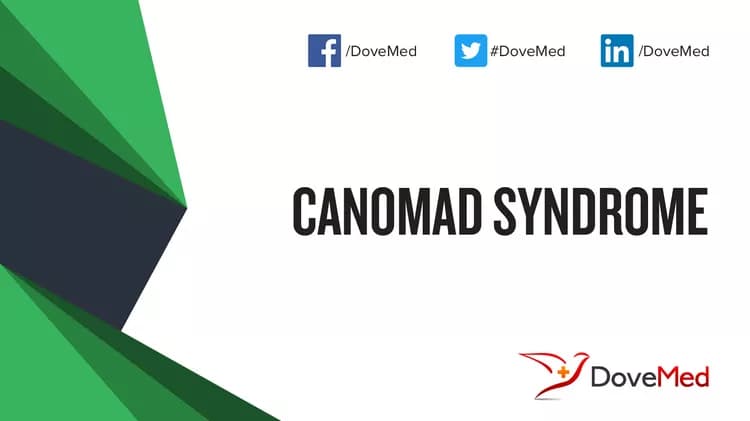What are the other Names for this Condition? (Also known as/Synonyms)
- Chronic Ataxic Neuropathy Ophthalmoplegia IgM Paraprotein Cold Agglutinins Disialosyl Antibodies Syndrome
- Chronic Ataxic Neuropathy Ophthalmoplegia M-Protein Agglutination Disialosyl Antibodies Syndrome
- Chronic Sensory Ataxic Neuropathy with Anti-Disialosyl Antibodies
What is CANOMAD Syndrome? (Definition/Background Information)
- CANOMAD Syndrome is a rare chronic immune-mediated demyelinating polyneuropathy. CANOMAD stands for Chronic Ataxic Neuropathy Ophthalmoplegia IgM paraprotein Cold Agglutinins Disialosyl antibodies. This condition is caused by the presence of anti-diasialosyl antibodies in the body
- Signs and symptoms of CANOMAD Syndrome may include loss of muscle, tendon, and joint sensation, abnormal gait (walk), ataxia, tingling sensation on the skin around the mouth or extremities, paralysis of eye muscles, difficulty swallowing and speaking, and rarely respiratory muscle weakness
- Oral or intravenous corticosteroids, ß-interferons, plasma exchange, intravenous immunoglobulin (IVIG), and cytotoxic drugs have all been used in treating CANOMAD Syndrome with varying success
(Source: CANOMAD Syndrome; Genetic and Rare Diseases Information Center (GARD) of National Center for Advancing Translational Sciences (NCATS), USA.)
Who gets CANOMAD Syndrome? (Age and Sex Distribution)
- CANOMAD Syndrome is a rare disorder; the exact prevalence of the disorder is unknown
- The presentation of symptoms may typically occurs in adulthood
- Both males and females may be affected
- Worldwide, individuals of all racial and ethnic groups may be affected
What are the Risk Factors for CANOMAD Syndrome? (Predisposing Factors)
- Currently, no risk factors have been clearly identified for CANOMAD Syndrome
It is important to note that having a risk factor does not mean that one will get the condition. A risk factor increases one’s chances of getting a condition compared to an individual without the risk factors. Some risk factors are more important than others.
Also, not having a risk factor does not mean that an individual will not get the condition. It is always important to discuss the effect of risk factors with your healthcare provider.
What are the Causes of CANOMAD Syndrome? (Etiology)
- The underlying cause of CANOMAD Syndrome is poorly understood. It appears as if IgM antibodies play a crucial role in the development of the disorder
- It also appears as if the condition is caused in some way by the presence of anti-diasialosyl antibodies in the body
- The source of anti-diasialosyl antibodies found in individuals with CANOMAD syndrome is unknown
(Source: CANOMAD Syndrome; Genetic and Rare Diseases Information Center (GARD) of National Center for Advancing Translational Sciences (NCATS), USA.)
What are the Signs and Symptoms of CANOMAD Syndrome?
The signs and symptoms of CANOMAD Syndrome may include:
- Loss of kinesthesia: Kinesthesia refers to the perception of one's own body parts, weight, and movement. A loss of kinesthesia refers to the loss of sensation produced in muscles, tendons, and joints involved in movement
- A distinct manner of walking (gait)
- Inability to coordinate voluntary muscular movements in the upper limbs
- Pricking, tingling, or creeping on the skin in the tissues around the mouth (perioral) or extremities (acral)
- Paralysis of some of the eye muscles (ophthalmoplegia)
- Difficulty swallowing
- Difficulty articulating words
- Respiratory muscle weakness
(Source: CANOMAD Syndrome; Genetic and Rare Diseases Information Center (GARD) of National Center for Advancing Translational Sciences (NCATS), USA.)
How is CANOMAD Syndrome Diagnosed?
The diagnosis of CANOMAD Syndrome may be challenging, and involve the following:
- Complete physical examination
- Thorough medical history evaluation
- Assessment of signs and symptoms
- Laboratory tests
- Imaging studies
- Biopsy studies, if necessary
Many clinical conditions may have similar signs and symptoms. Your healthcare provider may perform additional tests to rule out other clinical conditions to arrive at a definitive diagnosis.
What are the possible Complications of CANOMAD Syndrome?
The complications of CANOMAD Syndrome may include:
- Progressive difficulty with movement and coordination
- Loss of balance may lead to falls and injuries
- Weight loss due to difficulties in swallowing
- Inability to articulate thoughts owing to problems with speech
- Respiratory distress, if muscles in the respiratory tract weaken
- Low self-esteem
Complications may occur with or without treatment, and in some cases, due to treatment also.
How is CANOMAD Syndrome Treated?
The treatment for CANOMAD Syndrome may include:
- Oral or intravenous corticosteroids
- ß-interferons
- Plasma exchange
- Cytotoxic drugs
- Intravenous immunoglobulin (IVIG)
- A combination of the above therapies
The IVIG and plasma exchange treatments are reported to offer temporary relief to affected individuals. The short-term and long-term benefits of ß-interferons, corticosteroids and cytotoxic drugs have not been evaluated.
How can CANOMAD Syndrome be Prevented?
- The exact cause of CANOMAD Syndrome is not known, and hence, no methods or guidelines are available towards preventing this disorder
- Active research is currently being performed to explore the possibilities for treatment and prevention of disorders such as CANOMAD Syndrome
- Regular medical screening at periodic intervals with tests and physical examinations are recommended
What is the Prognosis of CANOMAD Syndrome? (Outcomes/Resolutions)
- The prognosis of CANOMAD Syndrome is dependent upon the severity of the signs and symptoms and associated complications, if any
- Individuals with mild conditions have better prognosis than those with severe symptoms and complications
- Typically, the prognosis may be assessed on a case-by-case basis
Additional and Relevant Useful Information for CANOMAD Syndrome:
The following DoveMed website link is a useful resource for additional information:
Related Articles
Test Your Knowledge
Asked by users
Related Centers
Related Specialties
Related Physicians
Related Procedures
Related Resources
Join DoveHubs
and connect with fellow professionals


0 Comments
Please log in to post a comment.